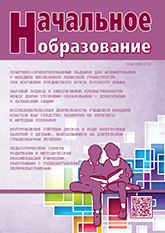The article proposes to consider the initial stage of the transition to such a form of training organization as collective classes in different-age groups of younger schoolchildren according to the methodology developed by the talented teacher A.G. Rivin. They are held at the Moscow secondary school named after Ivan Yarygin of the Krasnoyarsk region on the integrated content of academic subjects “Literary Reading”, “Fine Arts”, “Technology”. The specificity of the texts compiled by teachers for use in the process of paragraph-by-paragraph elaboration of the text using the technology of A.G. Rivina. Particular attention is paid to the issues of including first-graders (some of whom do not yet know how to read and write) in classes where younger schoolchildren of an older age participate. In this regard, multilevel algorithms of educational interaction are described. It highlights the difficulties that may arise with this form of training, as well as ways to overcome them.
forms of education; collective training in groups of different ages using the technology of A.G. Rivina; younger schoolchildren; the formation of reading literacy; integrated content of elementary school subjects: “Literary reading”, “Fine arts”, “Technology”; organization of training: consolidated detachment, pairs of replacement personnel; inclusion of first graders in classes; multilevel algorithms for educational interaction
1. Bondarenko L.V. Metodika Rivina. Izuchenie uchebnykh i nauchnykh tekstov v dialoge [Rivin's technique. Study of educational and scientific texts in dialogue]. Narodnoe obrazovanie [Public education]. 2016, I. 4-5, pp. 168-177. EDN: https://elibrary.ru/WJQCWX
2. Kollektivnoe obuchenie po individual'nym obrazovatel'nym programmam: kontseptsiya, konstruirovanie, prakticheskie varianty (na 2020 god) [Collective training according to individual educational programs: concept, design, practical options (for 2020)]. Krasnoyarsk: Tsentr stanovleniya kollektivnogo sposoba obucheniya Krasnoyarskogo instituta povysheniya kvalifikatsii i professional'noy perepodgotovki rabotnikov obrazovaniya Publ., 2021. 500 p. EDN: https://elibrary.ru/AGTYSD
3. Kuznetsov A.A., Chernobay E.V. Krizis klassno-urochnoy sistemy obucheniya pri perekhode shkoly na FGOS novogo pokoleniya [Crisis of the classroom-lesson system of education during the transition of schools to the federal state educational standard of a new generation]. Pedagogika [Pedagogy]. 2015, I. 2, pp. 19-26.
4. Lebedintsev V.B. Literaturnoe chtenie: metodicheskiy instrumentariy, formirovanie klyuchevykh umeniy. 1-4 klassy [Literary reading: methodological tools, the formation of key skills. 1-4 grades]. Volgograd: Uchitel' Publ., 2013. 158 p.
5. Lebedintsev V.B. Formirovanie universal'nykh uchebnykh deystviy v nachal'noy shkole [Formation of universal educational actions in elementary school]. Moscow: Ileksa Publ., 2016. 208 p. EDN: https://elibrary.ru/VIBSUJ
6. Mkrtchyan M.A. Stanovlenie kollektivnogo sposoba obucheniya [Formation of a collective way of learning]. Krasnoyarsk: Krasnoyarskii kraevoy institut povysheniya kvalifikatsii i professional'noy perepodgotovki rabotnikov obrazovaniya Publ., 2010. 228 p. EDN: https://elibrary.ru/QYJKMX






